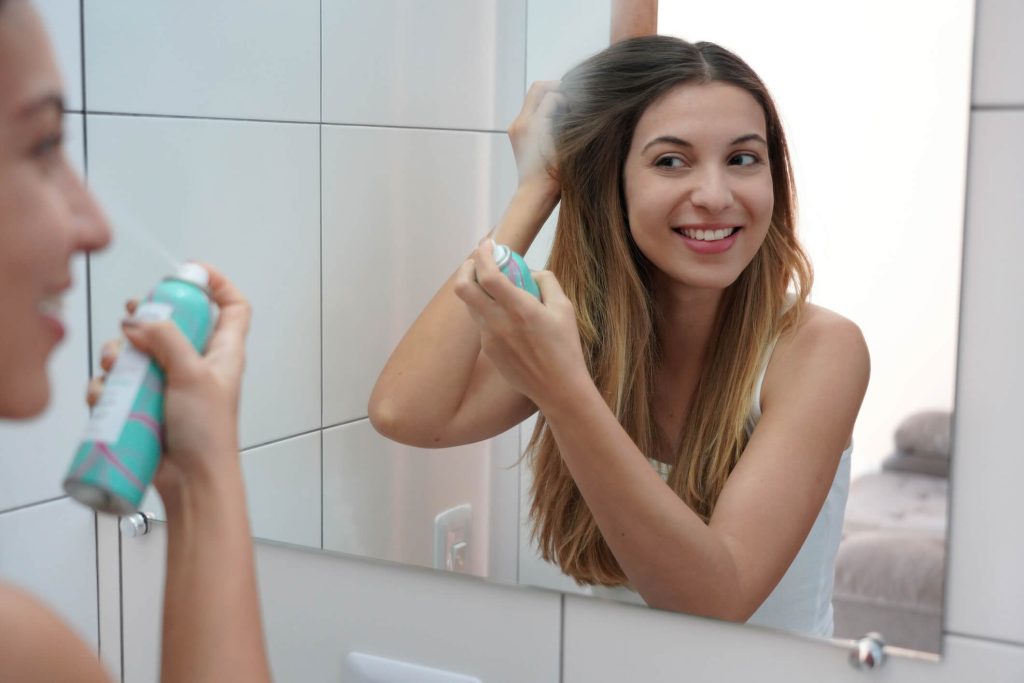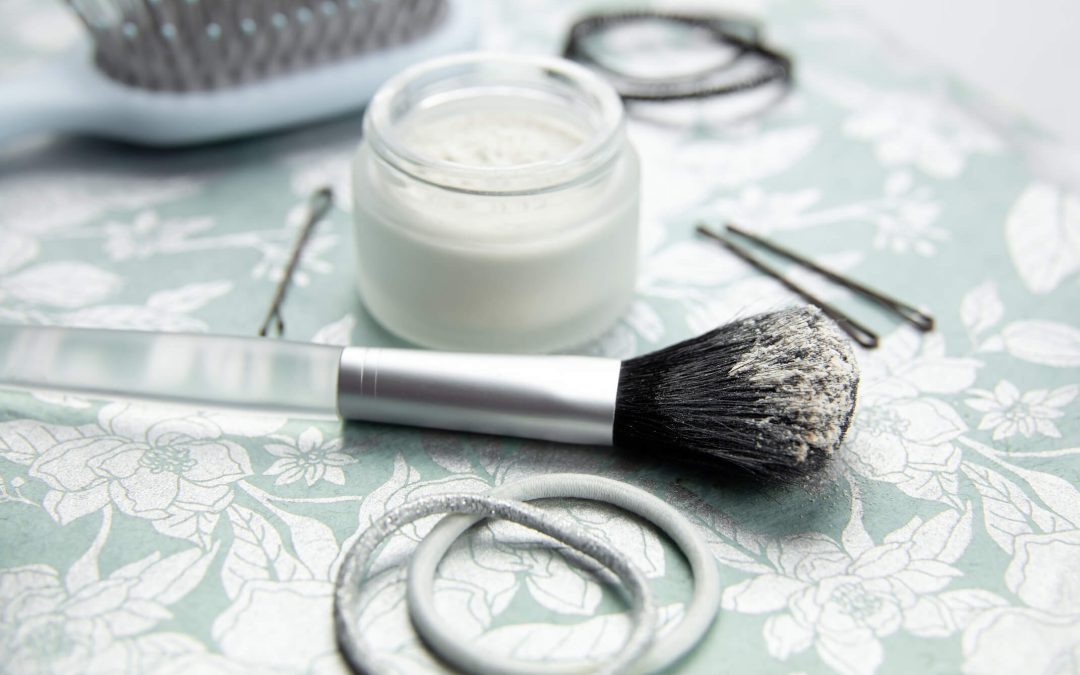Doest dry shampoo cause hair loss? Dry shampoo has recently become a mainstay in many haircare regimens, offering a convenient option for both men and women. It promises to save time and effort by revitalizing and refreshing hair between washes, absorbing excess oil and debris. However, frequent use can impact hair health, mainly if used excessively. The aerosol spray often contains starches, fragrances, and other ingredients that may affect the scalp. Over time, applying dry shampoo can cause a buildup of bacteria, debris, and calcification on the scalp, leading to potential damage.
While dry shampoo provides styling options and helps maintain hairstyles between washes, it’s essential to understand the frequency and ways it might affect the skin and head. This can lead to clogged pores and hinder the natural hair wash process, causing damage to the hair follicles. Let’s explore the causes and ways to balance dry shampoo use for healthy hair and skin, separating fact from fiction in the beauty industry.
What is Dry Shampoo?
Without water, dry shampoo is a haircare treatment that removes extra oil and grease from the scalp, leaving hair looking cleaner and fresher. Starch, clay, or alcohol are among the components that help absorb oil and revitalize hair, and it usually comes in spray or powder form. Ingredients like rice starch, cornstarch, talc, and other agents work by absorbing excess oil and dirt. Still, frequent use can lead to a buildup of particles on the scalp, potentially causing issues like folliculitis or clogged hair follicles. Experts suggest that while dry shampoo can be a quick fix for those with a busy lifestyle, it’s important to balance its use with proper hygiene and treatment options.
Overuse of dry shampoo may affect the scalp’s skin cells and even contribute to conditions like alopecia, especially in individuals with a genetic predisposition. Studies have also shown a potential link between the rate of dry shampoo usage and hair loss, mainly when the scalp’s natural oils are stripped away too often. While DIY alternatives or native shampoos may provide gentler options, it’s essential to consider diet, genetics, and other factors when choosing the best treatments for hair health. In the long term, considering different types of alternatives and exploring different treatments can help maintain the health of the hair follicle and avoid potential damage.
Is Hair Loss Possible with Dry Shampoo?
The short answer is that, when used sparingly, dry shampoo does not immediately result in hair loss. It may exacerbate problems that could indirectly result in hair thinning or loss if used excessively or improperly. Here are some explanations:
Obstructed Follicles
One of the main issues with excessive dry shampoo use is the accumulation of product residue on the scalp. If the scalp is not cleansed for an extended period of time, this residue can block hair follicles and cause irritation or inflammation. Blockages in hair follicles can prevent new hair from growing and may eventually cause thinning.
Health of the Scalp
Hair growth requires a healthy scalp. If dry shampoo is not thoroughly rinsed, the scalp can feel dry or itchy. This may result in dandruff, irritation, or scalp disorders like seborrheic dermatitis. These illnesses may contribute to hair loss by interfering with the natural hair development cycle.
Too Much Dryness
After using dry shampoo, the scalp may feel drier than usual, even though it absorbs oil. As a result, the natural oils on the scalp, essential for maintaining healthy hair, may become unbalanced. Hair that is brittle and more likely to break due to a dry scalp may appear to be falling out.
Hair Strand Stress
Using dry shampoo frequently can also cause product accumulation on hair strands, making hair feel stiff or heavy. Breakage may result, particularly if the hair is combed or styled roughly. Although broken strands of hair may give the appearance of thinner hair, this is not precisely hair loss from the root.
How to Safely Use Dry Shampoo
Here are some pointers to help you use dry shampoo safely without sacrificing the health of your hair if you enjoy its convenience:
- Avoid Skipping Regular Washes: Although dry shampoo works well to prolong the intervals between washes, it shouldn’t be used in place of routine shampooing. Wash your hair twice or thrice a week to keep your scalp healthy and remove buildup.
- Use Moderately: To prevent the product from oversaturating your scalp, try using dry shampoo sparingly. Give your scalp and hair a respite between uses, but use it as needed.
- Pick the Correct Product: Use dry shampoos without harsh chemicals and unnatural scents. Choose products that are kind to your hair and scalp and contain natural ingredients.
- Properly Clean Your Scalp: When you wash your hair, properly clean your scalp to remove any residue from the dry shampoo. Use a mild exfoliating shampoo to maintain a healthy scalp environment and help eliminate residue.
- Hydrate Your Scalp: If you experience dryness or irritation after using dry shampoo, use an oil or hydrating treatment to replenish moisture.
Myths and Facts about Hair Loss
Both men and women worry about hair loss, but it can be hard to tell facts from fiction when so much false information exists. You may choose your hair care regimen and treatment alternatives more wisely if you know the truth behind the myths. This piece will dispel some of the most widespread misconceptions about hair loss and provide the required information.
Myth 1: Only Men Are Affected by Hair Loss
Fact: Women also lose their hair, even though male-pattern baldness is more prevalent. By age fifty, almost forty percent of women will be noticeably thin or lose their hair. Hormonal fluctuations, pregnancy, menopause, and illnesses like polycystic ovary syndrome (PCOS) can all cause hair loss in women.
Myth 2: Too Much Hair Washing Leads to Hair Loss
Fact: Regular hair washing does not result in hair loss. Good hair development depends on maintaining a clean and clear scalp. Nevertheless, excessive heat style or harsh washes can harm hair and cause breakage. Avoid overwashing or using hot water, which can deplete the scalp of its natural oils, and instead use a mild shampoo.
Myth 3: Hair Loss Is Only Caused by Stress
Fact: Stress is not the only factor that causes hair loss; it can induce temporary hair shedding. The condition known as telogen effluvium, in which stress causes hair to enter the shedding phase prematurely, is transient and frequently goes away when the stressor is eliminated. Other reasons, such as poor nutrition, hormone imbalances, heredity, and medical disorders, can also cause hair loss.
Myth 4: Hair Loss Is Inherited Only From Your Mother’s Side
Fact: Both sides of your family may be affected by hair loss. Women can inherit hair loss genes from both parents, although male-pattern baldness is typically associated with the mother’s side. You may be at a higher risk of experiencing hair loss yourself if you have a family history of it, regardless of the cause.
Myth 5: Tight Hairstyles or Hats Cause Hair Loss
Fact: Hair loss is not a direct result of wearing hats or tight hairstyles like braids or ponytails. Nevertheless, excessively tight hairstyles can result in traction alopecia, which damages the hair follicles by pulling the hair too tightly. Preventing this kind of hair loss requires avoiding severe strain on the scalp.
Myth 6: Only Men Can Use Hair Loss Treatments
Fact: Both men and women can benefit from various hair loss treatments. Both sexes frequently take over-the-counter medications to promote hair growth, such as minoxidil (Rogaine). Men are usually prescribed prescription medications like finasteride (Propecia), but women may also benefit from hormone therapy or platelet-rich plasma (PRP) therapy.
Myth 7: Your Hair Grows Thicker After Cutting
Fact: Hair cutting does not impact the thickness or pace of hair growth. Hair grows not at the ends but at the scalp. Cutting off split ends and avoiding breakage can make your hair look thicker, but it has little effect on root-based hair development.
Myth 8: There Is No Way to Stop Hair Loss
Reversible hair loss is not usually the case. Hair loss can often be slowed down or even reversed with early intervention. Treatments such as PRP therapy, hair transplants, and minoxidil have been demonstrated to effectively promote hair regrowth. However, the cause of hair loss and the timing of treatment are key factors in the effectiveness of these treatments.
Myth 9: Hair Loss Is Caused by Dandruff
Fact: Hair loss is not caused by dandruff alone. However, hair damage might result from the itching and scratching frequently accompanying dandruff. Seborrheic dermatitis, which can cause hair thinning, is one underlying scalp ailment that severe dandruff may occasionally indicate. More hair damage can be prevented by treating the scalp condition.
Myth 10: Hair Loss Can Be Repaired Using Natural Methods
Fact: There is no scientific proof that natural therapies may stop hair loss, even if they help maintain the scalp’s health. Although oils like peppermint or rosemary may increase blood flow to the scalp, they are not likely to stop hormonal or genetic hair loss. Speaking with a healthcare provider about tried-and-true remedies if you’re suffering from severe hair loss is crucial.

Dry Shampoo in Orange County, California at Neograft Hair Restoration Orange County
Conclusion
To sum up, dry shampoo alone does not directly cause hair loss, but overuse or incorrect application can aggravate scalp issues that might result in hair breakage or thinning. The absorption of excess oil can be beneficial, but moderation is essential with any haircare product. You can profit from dry shampoo without running the danger of hair loss if you use it sensibly and care for your scalp. Dermatologists often advise patients to use dry shampoo in moderation and to ensure proper scalp hygiene to avoid potential damage.
If you’re worried about hair loss or experiencing excessive shedding, you should speak with a dermatologist or other haircare specialist to identify the underlying problem and explore potential remedies. They can provide valuable advice and tips, helping you determine the purpose of your hair care routine and the best treatment options. The FDA has not explicitly regulated dry shampoos, so it’s essential to understand the benefits and potential risks, especially when using powders and sprays. By considering these things, you can maintain the health of your scalp and hair while safeguarding your rights to informed choices in hair care.
Frequently Asked Questions
How can I tell whether my hair loss is caused by dry shampoo?
Look for symptoms like dryness, inflammation of the scalp, increased hair loss, or product buildup if you think dry shampoo is causing your hair loss. To find out the source of your hair loss, see a dermatologist or other haircare dermatologists if these symptoms continue, and consider using less dry shampoo.
Is it possible to give hair more volume using dry shampoo?
Yes, dry shampoo gives flat or sluggish hair more volume. It can make hair appear more prominent and voluminous by absorbing extra oil and raising hair at the roots.
Can wet hair be washed with dry shampoo?
Since dry shampoo is made to absorb extra oil and grease, it works best on dry hair. The product will not function properly if it is applied to wet hair. For optimal effects, let your hair air dry before using dry shampoo.
Does my hair feel cleaner after using dry shampoo?
Dry shampoo can make your hair seem cleaner by eliminating extra oil and revitalizing your scalp. However, it does not cleanse the hair like shampoo and water; thus, frequent washing is necessary to preserve scalp health and general cleanliness.
Can dandruff be alleviated with dry shampoo?
Dry shampoo can help absorb extra oil and temporarily lessen the appearance of flakes, but it is not a cure for dandruff. To address the root cause of your dandruff, it’s essential to use a specialized shampoo.
Can oily hair be improved with dry shampoo?
Yes, dry shampoo is made to help control oily hair by removing extra oil and revitalizing the scalp. It’s a fantastic solution for those with oily hair who wish to prolong the intervals between washes without making their hair feel heavy.
How can I determine which dry shampoo is best for my hair type?
Texture, oiliness, and scalp sensitivity are some of the characteristics that determine which dry shampoo is ideal for your hair type. Look for a volumizing dry shampoo for fine hair and a more absorbing composition for thicker hair. Use a mild, fragrance-free product if your scalp is sensitive.
Can a dry shampoo lead to an infection of the scalp?
Long-term use of dry shampoo without enough washing can result in clogged pores and bacterial growth, which increases the risk of developing scalp infections. To reduce this danger, washing your scalp frequently and keeping it clean is crucial.
Can thinning hair result from using dry shampoo?
Although frequent dry shampoo use can result in clogged follicles and scalp accumulation, which may impede healthy hair growth, dry shampoo does not directly cause hair thinning. If ignored, this may cause hair thinning over time.
Can an allergic response result from using dry shampoo?
Although uncommon, some people may be allergic to preservatives or perfumes found in dry shampoo. Stop using dry shampoo and seek assistance from a dermatologist if you have itching, redness, or swelling.
Understanding How Dry Shampoo Can Affect Hair Loss
Dry shampoo has gained popularity as a way to enhance volume, absorb extra oil, and revitalize hair in between washes. Although it can be a helpful substance, questions have been raised concerning how it might affect hair health. Dry shampoo overuse can cause product accumulation on the scalp, which clogs hair follicles and stops the scalp from breathing. This may cause hair thinning or breakage by interfering with the natural hair development cycle. Further impairing hair condition accumulation can also result in dandruff, dryness, or scalp irritation.
It’s crucial to remember that dry shampoo doesn’t cause hair loss by itself; however, excessive use or incorrect application can lead to an unhealthy environment on the scalp. When used sparingly, dry shampoo can be a valuable substitute for traditional hair washing. You must wash your hair regularly to remove buildup and keep your scalp clean and healthy.
Whether dry shampoo is the reason or another issue, we at Neograft Hair Restoration Orange County understand the worries associated with hair loss. To help you regain your confidence, our clinic provides a range of hair restoration procedures and scalp care products. Contact us for a consultation if you’re having problems with your scalp or hair thinning due to using dry shampoo. To assist you in your hair restoration journey, our professionals will evaluate the condition of your scalp and develop a customized treatment plan tailored to your unique needs.














Recent Comments